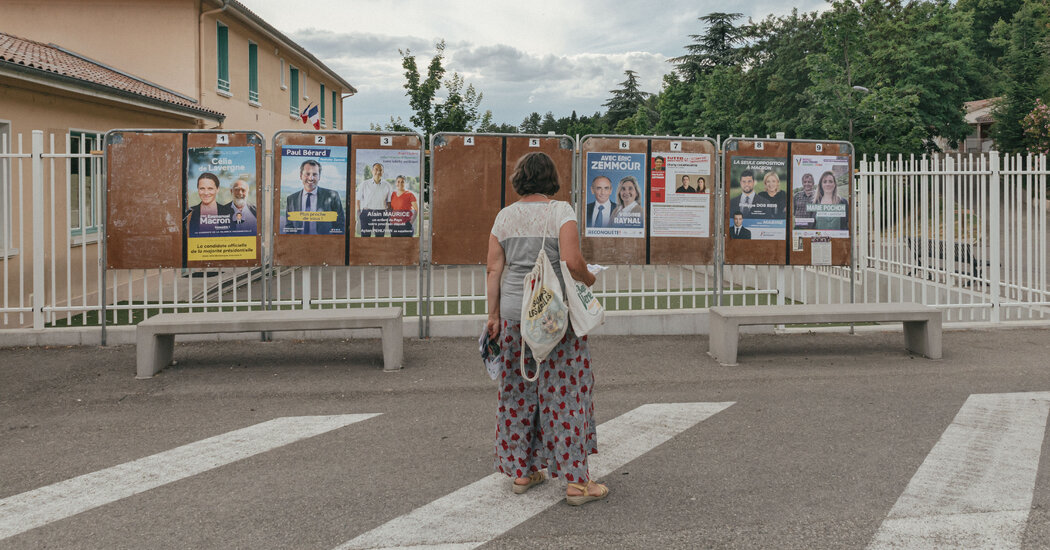
PARIS — Weeks after re-electing President Emmanuel Macron, voters in France return to the polls on Sunday to choose their parliamentary representatives, elections that will determine whether Mr. Macron’s bills sail or stumble through the legislature during his second term.
All 577 seats are up for grabs in the National Assembly, France’s lower and more powerful house of Parliament, which Mr. Macron’s party and its allies currently control. Most polls predict that will remain the case — to a degree.
France’s modern presidential and parliamentary elections are held only months apart, on the same five-year cycle. Over the past two decades, voters have always given their newly elected president strong parliamentary backing, and polls and experts suggest that would be a likely outcome for Mr. Macron this time, too.
His biggest challenge comes from a reinvigorated alliance of France’s left-wing forces, which have taken the rare step of setting aside personal squabbles and ideological differences to mount a united front. Jean-Luc Mélenchon, the leader of the far-left France Unbowed party, the dominating force in that alliance, is hoping it can eke out a narrow victory and compel Mr. Macron to appoint him prime minister.
But so far, according to recent surveys, voters have been more concerned by surging inflation than by the campaign, and pollsters say they expect record-low turnout.
Here is a primer on the elections, which will be held in two rounds, on Sunday and on June 19.
What is at stake?
Presidents hold France’s most powerful political office, with broad abilities to govern by decree. But they need Parliament, and especially the National Assembly, to accomplish most of their bigger domestic policy goals, push through spending bills or change the Constitution.
Emmanuel Macron’s Second Term as President of France
With the reelection of Emmanuel Macron, French voters favored his promise of stability over the temptation of an extremist lurch.
Some of Mr. Macron’s prominent campaign promises, like his vow to raise the legal age of retirement, require legislation. His new government also wants to tackle the effects of inflation, requiring lawmakers to vote on measures like food subsidies.
The main players in the elections are:
-
Ensemble, a centrist coalition that includes La République en Marche, the party that Mr. Macron founded and that swept to victory in 2017 with a wave of political newcomers as candidates.
-
La Nouvelle Union Populaire Écologique et Sociale, more commonly known by its acronym NUPES, a left-wing alliance brought together by Mr. Mélenchon’s France Unbowed party that includes the Socialist, Green and Communist parties.
-
A group of traditional right-wing parties, led by Les Républicains, the mainstream conservatives.
-
The far-right National Rally party of Marine Le Pen, who was defeated by Mr. Macron in the presidential runoff in April.
The latest polls suggest that Ensemble and NUPES are neck-and-neck, with about 25 to 28 percent each. The National Rally is predicted to receive around 20 to 21 percent of the vote, with Les Républicains roughly 10 to 11 percent. Smaller groups, including the party of Éric Zemmour, a far-right pundit who ran for president, are polling in the single digits.
If Mr. Macron’s party alone musters an absolute majority of seats — 289 — he will have relatively free rein to enact his legislative agenda. A repeat of the current situation, in which his party and its allies hold an absolute majority, would make him dependent on the coalition to pass some legislation. But if his party and its allies lose too much ground, they could be forced to reach out to lawmakers from opposing parties on certain bills. And if NUPES is able to secure control of Parliament, it would force Mr. Macron to appoint a new prime minister and a new cabinet, potentially blocking much of his agenda.
How do the elections work?
France’s 577 electoral districts cover the mainland, overseas departments and territories, as well as French citizens living abroad. Each district has one seat. More than 6,200 candidates are running for office nationwide.
Any number of candidates can compete in the first round in each district, but there are specific thresholds to reach the second round. While in most cases the runoff will feature the top two vote-getters, it can sometimes feature three or even four of them. Whoever wins the most votes in that runoff wins the race. (Under some conditions, a candidate who gets more than 50 percent of the vote in the first round wins outright.)
The two-round system usually produces stable majorities that French governments can rely on, but it comes at a cost. The makeup of the National Assembly does not always accurately reflect the country’s broader political landscape and usually skews in favor of bigger parties. Smaller ones complain that their voters do not get the representation they deserve, fueling disaffection with the political system.
French presidential candidates, including Mr. Macron, have repeatedly floated the idea of fixing that discrepancy by introducing a dose of proportional representation for parliamentary elections. But a bill on that issue never came to fruition during Mr. Macron’s first term, and it is unclear whether he will pursue the idea during his second.
What does the National Assembly do?
The National Assembly and the Senate — currently controlled by the right — are France’s two houses of Parliament. Both are based in Paris and play important roles in drafting bills and voting laws. But only the National Assembly is elected directly by the people, and it has more leeway to legislate and challenge the executive.
The National Assembly usually has the final word if the two houses disagree on a bill, and it is the only house that can topple a French cabinet with a no-confidence vote. It has some prerogatives on key legislation like spending or social security bills.
Lawmakers can question cabinet members; they can also establish investigative commissions and hold hearings, although their powers and the scope of their investigations are more limited than congressional inquiries in the United States.
Unless the president dissolves the National Assembly and calls for new elections — a move that is rarely attempted — lawmakers are in office for five years.
What comes next?
The last voting stations close at 8 p.m. on Election Day, which is when the French news media will work with pollsters to publish the first projected results based on preliminary counts. Races will be called district by district as the evening progresses.
Those first results will give a sense of each party’s standing and of the direction each race might take, but the National Assembly’s final composition will become clear only after the runoffs.
Several ministers are running in the elections, including Élisabeth Borne, the prime minister. Their races will be closely watched, as a loss by one or several of them would be seen as a rebuke of Mr. Macron, who has warned that those who are not elected will leave his cabinet.




